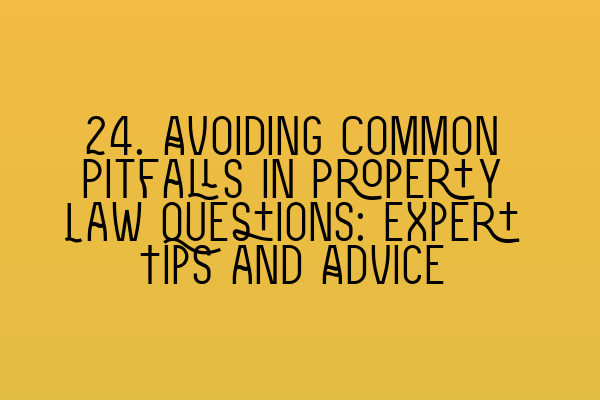Avoiding Common Pitfalls in Property Law Questions: Expert Tips and Advice
Property law is a complex and dynamic field that requires a deep understanding of legal principles and practical application. Whether you are studying for the SQE exams or practicing as a property law solicitor, it is crucial to have a thorough grasp of the subject. However, even the most experienced professionals can stumble upon common pitfalls when it comes to property law questions. In this article, we will explore some of these pitfalls and provide expert tips and advice on how to avoid them.
1. Understanding the question
One of the most common pitfalls in property law questions is failing to fully understand the question being asked. It is essential to carefully read the question and identify the key issues and legal principles involved. Make sure to pay attention to any specific facts or scenarios outlined in the question, as they can significantly impact your analysis and response. Take your time to consider all aspects of the question before jumping into answering it.
2. Organizing your answer
Another common mistake is providing a disorganized answer that lacks coherence and structure. To avoid this, it is crucial to organize your thoughts and present your answer in a clear and logical manner. Start by outlining the key points you want to cover and consider the most effective order in which to address them. Use headings, bullet points, and paragraphs to break up your answer and make it easier to follow. By presenting your answer in a well-structured way, you not only make it more accessible to the reader but also demonstrate your ability to analyze complex legal issues systematically.
3. Applying the law
Property law is heavily reliant on legal principles and precedents. A common pitfall is providing a general analysis without referring to specific laws or cases. To avoid this, make sure to clearly identify and apply the relevant legal principles to the specific facts of the question. Whenever possible, provide examples of relevant case law or statutes to support your argument. This not only strengthens your analysis but also demonstrates a deep understanding of the law and its practical application.
4. Considering alternative viewpoints
When answering property law questions, it is essential to consider alternative viewpoints and counterarguments. Failing to do so can weaken your analysis and undermine the credibility of your argument. Take the time to consider other possible interpretations of the law or different perspectives that may exist. By addressing potential counterarguments and providing a balanced analysis, you showcase your critical thinking skills and ability to consider multiple viewpoints.
5. Keeping up to date
Property law is a constantly evolving field, with new legislation and case law emerging regularly. It is crucial to stay up to date with developments in the law to ensure your answers are accurate and reflective of the current legal landscape. Make a habit of regularly reading property law journals, attending legal seminars, and keeping an eye on relevant legal websites for updates. Staying informed and knowledgeable about the latest legal developments will help you provide accurate and authoritative answers.
Conclusion
Avoiding common pitfalls in property law questions is essential for success in exams and legal practice. By fully understanding the question, organizing your answer effectively, applying the law appropriately, considering alternative viewpoints, and staying up to date with legal developments, you can enhance your performance and showcase your expertise. Remember, practice makes perfect, so make use of SQE 1 practice exams and SQE 2 preparation courses to strengthen your understanding and skills. With the right approach and dedication, you can navigate property law questions with confidence and excel in your legal career.
For more information and resources related to property law and the SQE exams, check out these articles:
